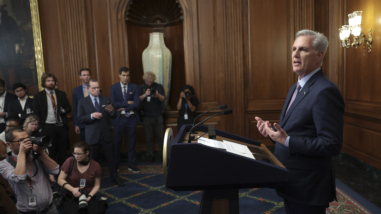Congratulations to the hardworking team at the Washington Monthly for an outstanding January/ February issue. Given how this magazine consistently punches above its weight, the Madison Initiative is pleased to be helping underwrite their efforts with a multi-year grant for general support. In this issue I’d recommend you be sure to read Donald Kettl’s “Ten Secret Truths About Government Incompetence,” (including my personal favorite: “half the time, when it looks like it’s the president’s fault, the problems really come from Congress.”) Next you might take in Kevin Kosar’s essay on how Congress is shooting itself in the foot, or really the brain, by chronically under-funding the work of the Congressional Research Service. Don’t overlook John DiIulio’s review of Frank Fukuyama’s masterwork, Political Order and Political Decay, for an extended treatment of “The Rise and Fall of the U.S. Government” and what it would take for it to rise again. From there you can go on to understand how climate change is messing with polar bears’ food supply in ways that aren’t good—“to a starving polar bear, a human is just meat”—or learn about “Three Simple Fixes that Could Save Pro Football,” among other diversions.
The biggest must-read piece in the entire issue is actually the Editor’s Note from Paul Glastris: “Why a Second Progressive Era Is Emerging—And How Not to Blow It.” Pointing to the difficulties and dissatisfactions that are increasingly rampant, Glastris detects “a seed of hope” and suggests we are on the verge of an era of positive change—setting the stage for the kind of effective, responsive government that the Madison Initiative’s work is intended to support—that could rival that which occurred at the outset of the 20th Century. But he notes two fundamental differences between then and now:
The first is that progressivism between 1890 and 1921 was bipartisan. Each party had its progressive wing, and each competed with the other in articulating a reform agenda. Today, progressivism is profoundly one-sided. It is the dominant force within the Democratic Party and at best a tiny, rump, besieged minority in the Republican Party….The second great difference is the almost complete lack of attention being paid by modern progressives to public administration and government structure… for the most part today’s left-leaning progressives are almost entirely focused on politics, economic justice, social issues, and the influence of money in politics. These are important subjects. But the vast complex of government is largely a black box to these folks.
What I’m saying is this: there are energies being unleashed today that give the country a shot at reforming itself. But reform can’t and won’t happen until the left takes government—its structure and functioning—far more seriously, and until the right develops a stronger pro-government wing that can win over conservative supporters and compete with Democrats, challenging their blind spots while partnering on needed reforms.
Whether you are waiting to welcome a second Progressive Era or not—not all of us are—you have to admit that the man has a point.



